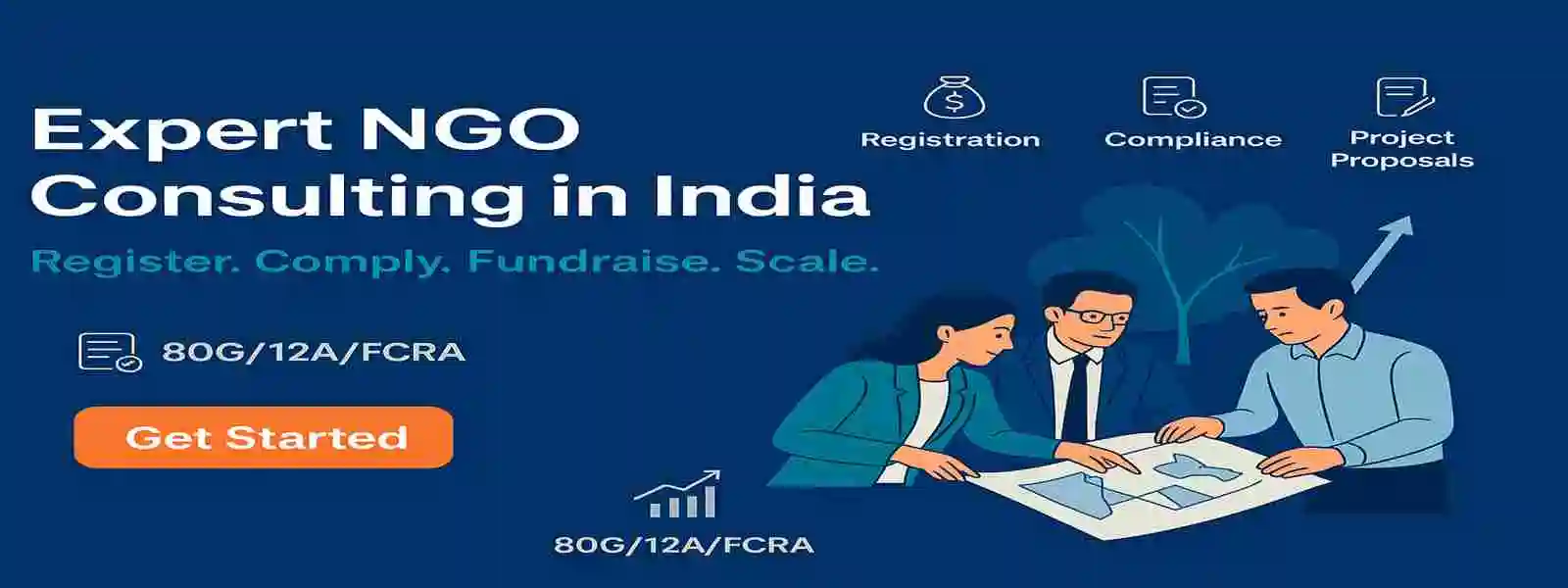Best Ngo Consultant

Our Services
NGO
Trust/Society/Section8 Company
12A/80G Tax Exemption
CSR-1
Niti Aayog
Fund Raising
Ongoing NGO Compliance
Annual Compliance & Accounting
FCRA
NGO Website & Branding
Want to start an NGO in India? Trust, Society & Section 8
Our expert consultants provide step-by-step guidance to help you set up your Trust, Society or Section 8 Company. We offer strategic advice, legal structuring support and assistance with relevant compliance processes like 80G, 12A, CSR-1 and more — so you can focus on your mission.
What is an NGO?
An NGO (Non-Governmental Organization) is a non-profit voluntary group that works to promote social, cultural, educational, religious or economic causes. In India, NGOs operate independently of the government and can be structured as a Trust, Society or Section 8 Company.
Types of NGOs in India
1. Trust
Ideal for long-term charitable work like education, health or relief initiatives. Trusts are governed by the Indian Trusts Act (varies by state) and are often simpler to manage for smaller initiatives.
- Best for: Charitable work with simpler operations
- Minimum members: 2 trustees
2. Society
Popular for NGOs working in education, culture or community development. Societies are registered under the Societies Registration Act and require a governing body with regular meetings.
- Best for: Community-focused or multi-state initiatives
- Minimum members: 7 (from different states for national scope)
3. Section 8 Company
Structured under the Companies Act this format is suitable for NGOs seeking high credibility, CSR partnerships or international collaborations. It involves more compliance but offers better recognition.
- Best for: Large-scale NGOs, CSR or foreign-funded projects
- Minimum members: 2 directors
Documents to start your NGO
- Aadhaar & PAN of founders
- Passport-sized photos
- Electricity bill/rent agreement (office address proof)
- NOC from property owner (if applicable)
- Draft MOA & Rules (Society)
- Trust Deed (for Trusts)
- Digital Signature Certificate (for Section 8)
Ongoing NGO compliance support
- 12A Compliance Support – Guidance for Tax Exemption
- 80G Compliance Support – Help Your Donors Save Tax
- CSR-1 Consulting – Get Guidance on CSR Eligibility
- NITI Aayog Darpan Support – Essential for NGO Visibility
- FCRA Consulting – Support for NGOs Receiving Foreign Funds
- Custom NGO Websites & Branding Solutions
Why Clients Trust Our NGO Experts
- Full-Service NGO Consulting – Legal Setup,12A, 80G, CSR & More
- Expert support – Dedicated consultant for your NGO
- Digital NGO Consulting – Guidance Across India
- Affordable packages – Flat pricing, no hidden costs
- Trusted by 500+ NGOs – Across sectors like health, education & environment
Want to start an NGO in India? (FAQ):
A: It depends on your goals.
- Section 8 Company offers strong legal structure and is often preferred for grants and partnerships.
- Trust is simpler to set up and suits long-term charitable work.
- Society works well for community or regional initiatives.
A: No, Indian law requires a minimum number of members to register an NGO.
Trust: At least 2 trustees
Section 8 Company: Minimum 2 directors
Society: At least 7 members (from different states for national scope)
A single individual cannot register an NGO alone.
A: Yes, foreigners and NRIs can be involved in Indian NGOs. However, at least one resident Indian is typically required during registration. NGOs with foreign members may need extra documentation especially if planning to receive foreign donations—FCRA compliance is essential in such cases.
A: FCRA (Foreign Contribution Regulation Act) is only required if your NGO intends to receive donations from outside India. If you’re funded solely within India, FCRA is not mandatory.
Feel Free To Contact
Office : 96A Barakhambha lane, New Delhi – 110001 India
Call Us : + 91 98044 12048
Email Id : info@politicalpartyregistration.co.in
Disclaimer: This website is operated by a private consultancy and is not affiliated with any government authority. We do not claim to represent, be endorsed by or be officially connected to any government department or agency. The forms on this website are intended solely to collect information to help us understand your requirements and offer appropriate guidance.
We provide consultancy services based on client requests and any fees charged are for these professional services only. We may collaborate with third-party experts or partners as needed to fulfill service delivery.
By using this website, you acknowledge and accept that we are an independent service provider offering advisory and support services—not an official registration portal.